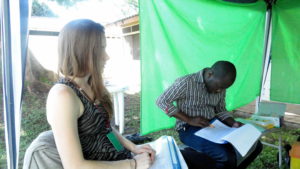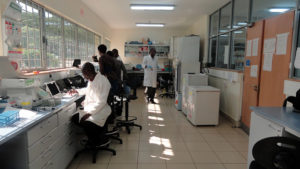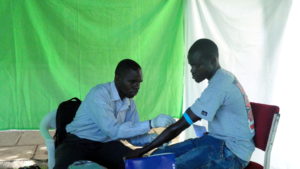Capstone Experience

Each CTEGD T32 Fellow is given the opportunity to participate in a capstone experience towards the end of their fellowship period. The capstone experience can take any number of forms as the goal is to enhance the training experience and provide an opportunity that the trainee may not otherwise be able to take part in. Past fellows have traveled internationally to take part in field research while others have spent time in another U.S.-based laboratory to learn new skills and technology. See some their stories below.
To apply
A request for capstone funds should be prepared by the student with his/her mentor and the PI of the lab being visited (two pages max).
The document should include:
- The nature of the overall project of which this training is a part
- The research that will be done during the training period requested
- The time and location of the proposed training
- The reason why this training should be done in this location
- How the requested training will further the goals of the trainee
- A proposed budget
- The source of the funding that will support the actual research of the proposed training.
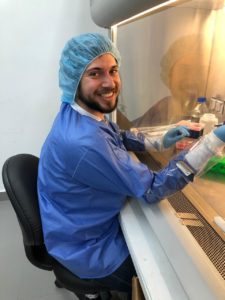
Quito, Ecuador – Manuel Fierro (2019)
For my T32 Capstone Trip, I went to Quito, Ecuador and collaborated with Dr. Fabián Sáenz from the Centro de Investigación para la Salud en América Latina (CISeAL) in the Pontifica Universidad Católica del Ecuador (PUCE). The purpose of this trip was to verify antimalarial resistance of field isolates from previous outbreaks in the north of Ecuador. The great misfortune of this trip was that I was not able to perform any experiments with the Ecuadorian field isolates. Instead, what I was able to do is establish a protocol I that would be needed in the future to perform similar assays on the Ecuadorian parasites by using lab-adapted strains. As a matter of fact, Fabián has already told me that he’s been able to invest more time and resources in this project due to the protocol I was able to establish. The experience I had was invaluably enriching for me. It exposed me to the reality of the resource abundance we have here in the US to perform research. In Fabián’s lab, I had to be continually aware of not wasting the resources I was using (such as tubes, tips, media) since the acquisition of these materials is not as expedient as it is here in the US. Despite the limitations, I was genuinely impressed by the hard work and expertise of Fabián and others at CISeAL which motivated me to want to come back to Ecuador and do research there. More importantly, I was able to acquire connections for my professional future in Ecuador, with many people in the Center inviting me back.
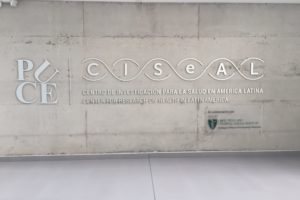
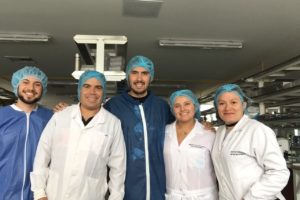

Roraima, Brazil – Heather Kudyba (2018):
Summary of the project:
The current method for diagnosing malaria infection is microscopy of a Giemsa stained thick blood smear. This technique can be subjective depending on the quality of the smears, the technicians training, the levels of parasitemia in the blood, and if the infection is a mix of different Plasmodium species. The treatments for different species of Plasmodium vary, and thus proper diagnostics are crucial. Additionally, the ability to detect low-levels of infection is crucial to the elimination of this parasitic disease. I visited three municipalities in Roraima, Brazil over a 6 week period (Boa Vista, Pacaraima, and Rorainópolis). We visited various health posts and clinics to collect blood from patients to test the practicality and effectiveness of a molecular-based diagnostic, Malachite Green Loop-Mediated Isothermal Amplification (MG-LAMP). We compared the results to the current diagnostic for malaria, microscopy, as well as another molecular-based diagnostic (that is highly sensitive, but requires more equipment, etc to perform) Photo-induced Electron Transfer PCR (PET-PCR).
Who did you work with during your capstone?
Dr. Joseli Oliveira-Ferreira (Institute Oswaldo Cruz- Fiocruz, Rio De Janeiro, Brazil)
Jaime Louzada (Federal University of Roraima, Roraima, Brazil)
Dr. Naomi W. Lucchi (Malaria Branch and Division of Parasitic Diseases and Malaria, Centers for Disease Control and Prevention, Atlanta, USA)
Dragan Ljolje (Atlanta Research and Education Foundation, Atlanta, USA)
What were some problems/issues you faced in your capstone research (if nothing, then don’t answer this)?
Working in a resource-poor environment is difficult and you often have to improvise and make do with limited equipment. It made the work a little harder but also gave me perspective on how lucky we are to work in well-equipped labs, such as the ones in the CTEGD.
What was the outcome of your capstone research?
Present poster at ASTMH and Publication in Malaria journal
How did the capstone help your personal and professional growth?
This experience opened many doors for me. I was able to meet and work with new people at the CDC and in Brazil. I made connections that I still maintain to this day. Working in an endemic area was eye-opening. It is one thing to work in the lab on malaria research, it is a completely other thing to see the devastating consequences of malaria infection in the world. This experience gave my work new meaning and purpose.
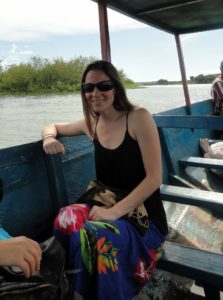
Kisumu, Kenya – Briana Flaherty (2014):
I did my capstone experience in May, 2014 with Dr. Dan Colley’s group in Kisumu, Kenya. Previous studies have demonstrated Th2 immune biasing in schistomsome-infected individuals. Such biasing may affect host immune responses to important vaccinations. My research in Kenya involved analyzing the influence of infection with schistosomiasis or soil-transmitted helminths on adult immune responses to the hepatitis B vaccine. My time was divided between the field, where I assisted with blood collections, and the lab, where I utilized enzyme-based immunoassays (ELISAs) to measure hepatitis B antibody levels in blood serum from study participants.
My experience in Kenya provided an exceptional opportunity to gain experience both working in the field and in a laboratory in a developing setting; this short time has had a profound impact on my future interests and career goals.
